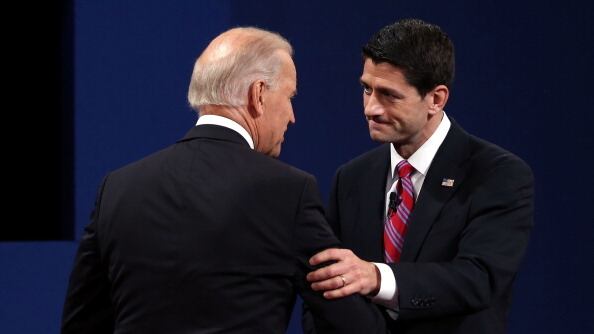It turns out both sides of the vice presidential debate want badly to avoid a war with Iran. Joe Biden proclaimed, "The last thing we need now is another war." His Republican opponent, Paul Ryan, said, "We want to prevent war." Surprisingly, it was the Republican, a relative foreign policy novice, who made the most salient point about how to avert a confrontation.
"They are not changing their mind," Ryan said, referring to Iranian leaders' recalcitrance to curb their program. "That's what we have to do, is change their mind so they stop pursuing nuclear weapons, and they're going faster." For good measure, he later added, "We both agree that to do this peacefully you've got to get them to change their minds."

Ryan's remark hinted at an unspoken truth: short of a ground invasion and regime change, the only way to be sure of preventing Iran from getting a nuclear weapon is a diplomatic resolution whereby Iran implements a rigorous system of internationally administered safeguards on its program.The entire point of the sanctions—the pressure of the dual-tracks of pressure and diplomacy—is to push Iran's leadership to strike such a deal on terms favorable to the U.S. Attaining that deal, though, will require a compromise from America, and compromise with Iran is hardly fodder for the height of the silly season.
According to hosts of former and current American officials—and some of Israel's former top security chiefs—attacking could be counterproductive, pushing Iran to oust the limited (but effective) inspections regime already in place and make the final decision to actually build a weapon. That leaves a deal.
At less fraught moments, the Obama administration hinted that it would allow Iran to enrich uranium to limited levels. However, a senior Romney adviser took a "zero enrichment" position in June, surely a non-starter for the Iranians, whose Foreign Minister reiterated this week, “If our right to enrichment is recognized, we are prepared to offer an exchange." Beyond recognition of their enrichment rights, the Iranians want sanctions relief. None was forthcoming from Ryan or Biden, or, for that matter, the international coterie charged with negotiating such a deal, the five permanent members of the security council plus Germany. Thus the Iranian recalcitrance, and the ensuing cycle of both sides demanding major concessions before offering any reciprocity.
In fact, the lesser members of the presidential tickets discussed no deal on Thursday night at all. Instead, Biden told us, "This president doesn't bluff" with his threats to use military force should the Iranians try to build a weapon. Ryan called for more sanctions and a "credible" military threat, eschewing any public discussion in the U.S. of the possible consequences as sending "all these mixed signals."
Ryan did take the time to reiterate the now-firmly established Romney campaign "red line" for war at an amorphously defined Iranian "nuclear weapons capability"—which aligns perfectly, like the "zero enrichment" position, with Benjamin Netanyahu. Ryan's point about convincing Iran to not build nukes made for a refreshingly candid admission at how the U.S. can avert war with Iran. Ryan is right: the Iranians need to be made to change their minds. But taking cues from Netanyahu makes me wonder if his is the right presidential ticket to make it happen.






